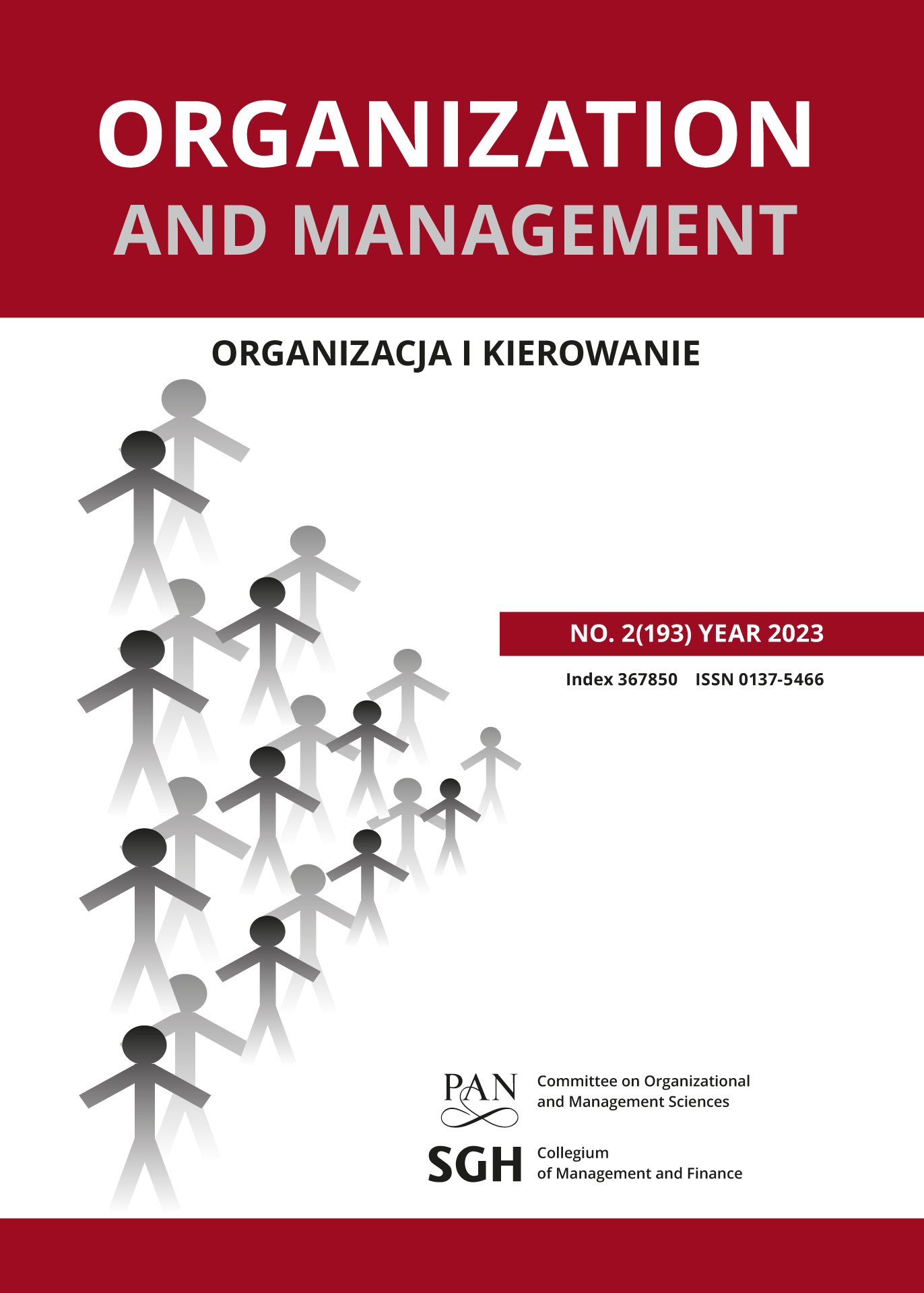THE MODIFIED RANK-RESOURCE METHOD OF EVALUATING NEW PRODUCT PROJECTS IN THE PORTFOLIO MANAGEMENT PROCESS IN PRE-MARKET PHASES
Main Article Content
Abstract
The success level in new products development is significantly dependent on the degree of competence of the company, firstly in the implementation of a new product development process (NPDP), and secondly in the proper evaluation and selection of new product design concepts (executing the right project). In particular, the second area of competence is related to the issues of portfolio management in the area of new product development. This is conceptual and methodic paper and has its backgrounds in strategic management concepts and applications, financial portfolio management, and relates closely to new product development research. The aim of the article is to present methods for valuing new product
projects in the new product development process, as well as to propose a new method for optimizing the value of the new product project portfolio. Methodological and research
limitations identified in this work result from time or information availability. They may also be related to the adopted quantitative and qualitative variables and the complexity of the proposed method. The basic problem formulated here concerns how to effectively allocate available resources to achieve the goals set for the new product. The article presents a rankresource method of new product project evaluation, to achieve optimal portfolio of new product projects management NPPM, in terms of value in the pre-market life cycle phases.
Article Details
References
Chagas Brasil, Vinicius & Eggers, J.P. (2019). Product and Innovation Portfolio Management. In book: Oxford Research Encyclopedia of Business and Management Publisher: Oxford University Press 10.1093/acrefore/9780190224851.013.28.
Brzozowski, M. (2014). Metody Zarządzania Portfelem Projektów, Studia Oeconomica Posnaniensia nr 11 (272), s. 9-24., Uniwersytet Ekonomiczny w Poznaniu.
Cabała P. (2018). Analiza efektywności portfela projektow, Zeszyty Naukowe Politechniki Poznańskiej, Nr 77, s. 17–29.
Cooper, R. G. (2014). What's Next?: After Stage-Gate, „Research-Technology Management”, 57 (1), 20–31.
Cooper, R. G. (2017). Winning at New Products. Creating Value through Innovation, (5th ed.), New York, Basic Books.
Cooper, R.G., Edgett, S.J. and Kleinschimidt, E.J. (1999). New product portfolio management: practices and performance. Journal of Product Innovation Management 16 (4):333-351.
Cooper, R.G., Edgett S.J. and Kleinschimidt E.J., (2000). New problems, new solutions: making portfolio management more effective. Research Technology Management 45(6): 43-49.
Cooper, R.G, Edgett, S.J and Kleinschimdt, E.J. (2001). Portfolio management for new product development: results of an industry practices study. R&D Management Journal 31(4): 361-380.
Crawford, M., Di Benedetto, A. (2011). New Products Management, (10th ed.), New York, McGraw-Hill Irwin.
Dąbrowski, D. (2022). Szacowanie przewagi konkurencyjnej w procesie rozwoju nowego produktu - ujęcie praktyczne. Zarządzanie organizacjami w społeczeństwie informacyjnym. Strategie - projekty – procesy, Wydawnictwo TNOIK, Toruń, 67-78.
De Meyer, A., Loch, C. H., & Pich, M. T. (2002). Managing project uncertainty: From variation to chaos. MIT Sloan Management Review, 43(2), 60–67.
De Reyck, Bert; Grushka-Cockayne, Yael; Lockett, Martin; Calderini, Sergio Ricardo; Moura, Marcio; and Sloper, Andrew. (2005). The impact of project portfolio management on information technology projects. International Journal of Project Management. 23, (7), 524-537. Research Collection Lee Kong Chian School Of Business. https://ink.library.smu.edu.sg/lkcsb_research/6748
Gierszewska, G., Romanowska, M. (2017). Analiza strategiczna przedsiębiorstwa, Warszawa, str. 162-163.
Hofman, M., Spalek, S., Grela, G. (2017). Shedding New Light on Project Portfolio Risk Management, „Sustainability”, vol. 9 (10), 1798.
Kettunen, Janne; Gruksha-Cockayne, Yael; Degraeve, Zeger; and De Reyck, Bert. (2015). New product development flexibility in a competitive environment.
European Journal of Operational Research. 244, (3), 892-904. Research Collection Lee Kong Chian School Of Business. Https://ink.library.smu.edu.sg/lkcsb_research/6760
Kharat, V. J. ., & Bhukya, K. R. N. (2022). Best Practices in Project Portfolio Management for Dynamic Decision Making. The Journal of Modern Project Management, 6 (1), https://journalmodernpm.com/manuscript/index.php/jmpm/article/view/JMPM01610
Killen, C. P., Hunt, R.A., Kleinschmidt, E.J. (2008). Project Portfolio Management for Product Innovation, „International Journal of Quality & Reliability Management”, 25 (1), 24–38.
Lahtinen, N., Mustonen, E. and Harkonen, J. (2021). Commercial and Technical Productization for Fact-Based Product Portfolio Management Over Lifecycle," in IEEE Transactions on Engineering Management, vol. 68, no. 6, pp. 1826-1838, Dec., doi: 10.1109/TEM.2019.2932974.
Loch, C. (2000). Tailoring product development to strategy: Case of a European technology manufacturer. European Management Journal, 18, 246–258.
Matheson, D., Menke, M.M. (1994). Making excellent R&D decisions, Research Technology Management, November-December, s. 21-24.
McNally, Regina C., Durmusoglu, Serdar S., Calantone, Roger J., Harmancioglu, Nukhet. (2009). Exploring new product portfolio management decisions: The role of managers' dispositional traits, Industrial Marketing Management, Volume 38, Issue 1, Pages 127-143, https://doi.org/10.1016/j.indmarman.2007.09.006.
Meskendahl, S. (2010). The Influence of Business Strategy on Project Portfolio Management and its Success – A Conceptual Framework, „International Journal of Project Management”, vol. 28 (8), s. 807–817.
Mikkola, J. H. (2001). Portfolio Management of R&D Projects: Implications for Innovation Management, „Technovation”, 21 (7), 423–435.
Nakata, Cheryl, Di Benedetto, C. Antony. (2012). Forward to the Future: The New
Knowledge Needed to Advance NPD - Innovation Theory and Practice, Journal of Product Innovation Management, 29, 3, May, 341-343.
Olsen, F. (1955). The Control of Research Funds, Coordinating, Control and Financing of Industrial Research, Kings Crown Press, Columbia University, New York.
Rutkowski, I.P. (2013). Zmodyfikowane metody analizy portfelowej i ich zastosowanie do oceny projektów innowacji produktowych, Nauki o Zarządzaniu / Uniwersytet Ekonomiczny we Wrocławiu 2013 | nr 4 (17) | 109-122.
Rutkowski I.P., (2016). Metody innowacji produktu : macierzowo-sieciowe metody pomiaru dojrzałości procesu innowacji produktu, Wydawnictwo Uniwersytetu Ekonomicznego w Poznaniu, Poznań.
Rybicki, J.M. (2000). Wielowymiarowy model analizy portfelowej jako narzędzie formułowania strategii rynkowej przedsiębiorstwa, Wydawnictwo Uniwersytetu Gdańskiego, Gdańsk, s. 59-60.
Stabryła, A. (2015). Zarządzanie projektami ekonomicznymi i organizacyjnymi, Wydawnictwo PWN, Warszawa, s. 162-166.
Stevens, S.S., (1946). On the theory of scales of measurement. Science, 103, 677-680.
Urban, G.L., Hauser, J.R. (2005). Design and Marketing of New Products, Prentice Hall, Englewood Cliffs, New Jersey, s. 146-147.
